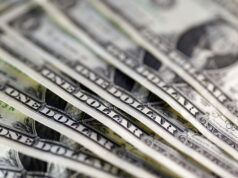Yields on 7-day term deposits decline as bids climb further
YIELDS on the central bank’s term deposit facility (TDF) declined as more investors sought to park their money amid the pandemic and as the market awaits further monetary easing.
Bids for the seven-day term deposits of the Bangko Sentral ng Pilipinas (BSP) totaled P137.159 billion on Wednesday, surpassing the P50 billion auctioned off and also higher than the P119.288 billion in tenders seen last week for a P30-billion offer.
Yields sought by banks for the one-week papers ranged from 2.25% to 2.375%, a slimmer band compared to the 2.295% to 2.5% margin seen on April 22. With this, the average rate for the seven-day papers clocked in at 2.3133%, decreasing by 12.36 basis points (bp) from the 2.4369% fetched a week ago.
Meanwhile, auctions for the longer 14- and 28-day term deposits continue to be suspended.
To support the banking system and financial stability, the central bank suspended its TDF auctions at the onset of the enhanced community quarantine in Luzon last month.
The TDF is the central bank’s primary tool to shore up excess liquidity in the financial system and to better guide market interest rates.
Rizal Commercial Banking Corp. Chief Economist Michael L. Ricafort said the fact that the seven-day term deposit offer was more than twice oversubscribed is a sign of strong liquidity in the market.
“Relatively huge bids manifested increased liquidity in the local financial system,” Mr. Ricafort said in an e-mail.
He said the lower yields may be due to the market factoring in further easing from the central bank.
“The latest week-on-week decline in the 7-year TDF auction average yield could be largely due to expectations of further cuts in the local policy rates and banks’ RRR (reserve requirement ratio) amid the sharp decline in global oil prices recently that could further lower inflation,” Mr. Ricafort said.
The strong demand and lower yields showed investors are worried over the current situation and want to “tie up their money for longer periods of time,” said UnionBank of the Philippines, Inc. Chief Economist Ruben Carlo O. Asuncion.
“This may mean that investors are really concerned about the near-term market and economic performance. Obviously, these signals come from the eventual economic impact of the COVID-19 (coronavirus disease 2019) pandemic,” Mr. Asuncion said in an e-mail.
BSP Governor Benjamin E. Diokno said earlier this week further easing is “still in the agenda” but said they will first assess the effect of its previous policy loosening on the banking industry.
The central bank fired off a 50-bp rate cut in an off-cycle meeting on April 16 to bring down borrowing costs to record lows. The overnight reverse repurchase rate now stands at 2.75%, while overnight ending and deposit rates are at 3.25% and 2.25%, respectively.
The Monetary Board (MB) has already slashed rates by 125 bps for this year alone, following the 75 bps in reductions done in 2019. This means they have fully reversed the 175 bps in hikes implemented in 2018.
Meanwhile, the reserve requirement ratio (RRR) of universal and commercial banks was cut by 200 bps in early April in a move to boost liquidity during the lockdown.
The MB has authorized Mr. Diokno to bring down RRR by up to 400 bps this year.
The government now sees flat growth or up to one percent contraction in gross domestic product (GDP) this year due to the economic impact of the virus.
Before the pandemic, the government targeted GDP growth of 6.5% to 7.5%, higher than the upward-revised six-percent expansion in 2019. — L.W.T. Noble



